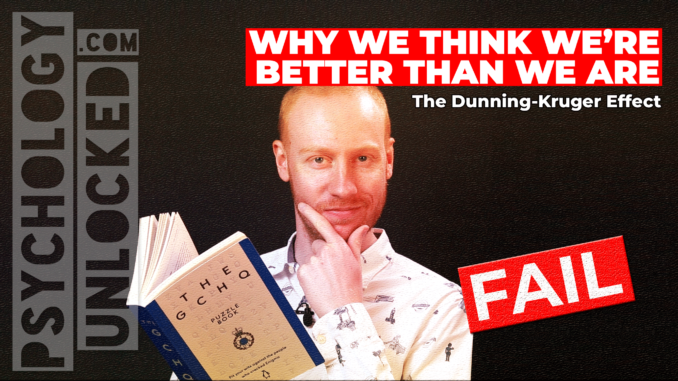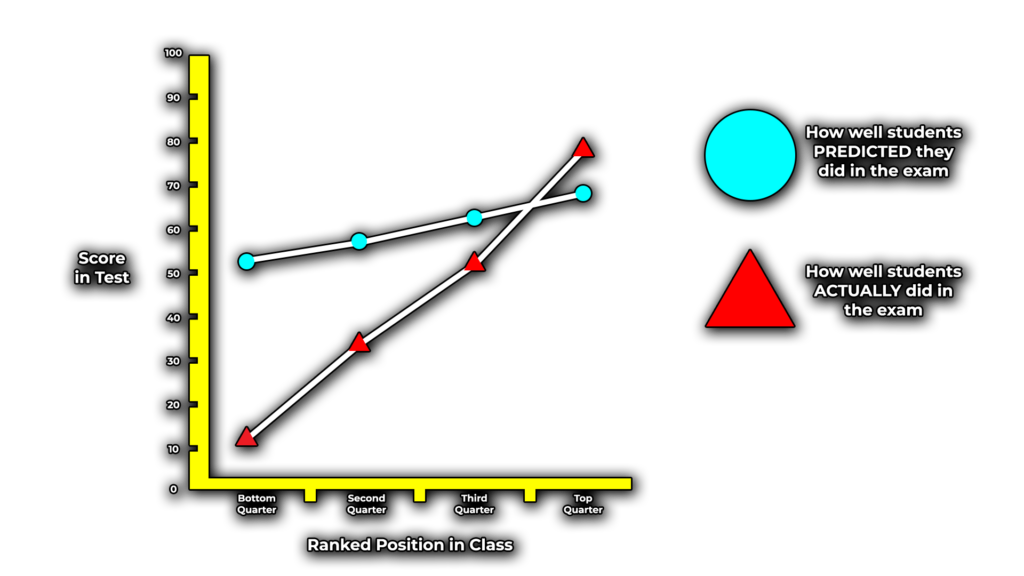
SCROLL DOWN FOR VIDEO
Have you ever noticed that funny quirk that you think you know something and then you learn a bit more and you realise how little you previously knew (even though you previously thought you knew all you needed to know!)?
This is a consequence of a cognitive bias called the Dunning-Kruger Effect.
Essentially the cognitive bias is such that those who know the least about something have a tendency to exaggerate their abilities the most.
- The Dunning-Kruger Effect: Why we think we know more than we do
- The Yale Food Addiction Scale: Are you addicted to food?
- Addicted to Pepsi Max? Understand addiction in six minutes (video)
“in many social and intellectual domains, people are unaware of their incompetence, innocent of their ignorance. Where they lack skill or knowledge, they greatly overestimate their expertise and talent, thinking they are doing just fine when, in fact, they are doing quite poorly.”
Dunning, Johnson, Ehrlinger & Kruger (2003)
To demonstrate the effect, Dunning et al. (2003) asked 141 psychology students to predict how well they had performed in an exam they had just taken.
The graph below shows how wrong the students were!

As the graph demonstrates, the students found it challenging to evaluate their own performance.
Students who achieved the highest scores in the exam actually thought they had performed worse than they actually had.
But the headline result is that the poorest performing students – who achieved around 10% in the exam – overestimated their abilities by the greatest degree – thinking they had achieved over 50%.
To phrase this another way, the bottom quarter of students predicted they had achieved higher grades than three quarters of the students actually achieved.
The Dunning-Kruger Effect isn’t limited to psychology students.
Hodges, Regent & Martin (2001) observed the same cognitive bias at play when they asked medical practitioners to evaluate their own patient interviewing skills.
Medical laboratory technicians were also prone to the Dunning-Kruger Effect when assessing their own knowledge of medical terminology and problem-solving ability in the lab (Haun, Zeringue, Leach & Foley, 2000).
Why does the Dunning-Kruger Effect exist?
Dunning and Kruger call their cognitive bias a “double curse”, because “the skills needed to produce correct responses are virtually identical to those needed to evaluate the accuracy of one’s responses” (Dunning et al., 2003).
For example, if I don’t know how to spell a word, I am also unable to evaluate whether my spelling of the word is correct or incorrect. If I knew how to evaluate my spelling, it means I could already spell the word.
“The skills needed to produce logically sound arguments are the same skills that are necessary to recognise when a logically sound argument has been made. thus, if people lack the skills to produce correct answers, they are also cursed with an inability to know when their answers are right or wrong.”
Dunning, Johnson, Ehrlinger & Kruger (2003)
As we saw in Dunning’s experiment with his psychology students above, top performers show a slightly different trend. They tend to be quite good at accurately estimating how well they have done. However, they are less good at predicting their performance relative to other people, as they seem to over-estimate how well others are doing (Fussell & Krauss, 1992).
Ironically, therefore, high-performers seem to succumb to a vicarious Dunning-Kruger Effect, in that they believe (as the poor performers do) that the poor performers are doing better than they actually are.
What can we do about the Dunning-Kruger Effect?
A surprising finding (Ehrlinger et al., 2003) shows that even when participants are incentivised with $100 for accuractely estimating their own performance, they still succumb to the Dunning-Kruger Effect.
So, what can we do about the Dunning-Kruger Effect? Afterall, people are more likely to change their mind or attitude about something when they have less confidence in their knowledge about it (Krosnick & Petty, 1995).
So if we want to break down societal prejudices and develop an open-minded, tolerant society, this is definitely a cognitive bias we should be tackling.
Complex analysis helps tackle Dunning-Kruger Effect
In the early 1980s, Linville (1982) devised an experiment to understand factors effecting extreme judgements (something is really good, or really bad).
Linville asked participants to rate a chocolate chip cookie, either by evaluating 6 factors or just 2 factors. The factors being judged included chewiness, butteriness and number of chocolate chips.
Participants who were induced to thinking about the cookie complexly – by rating 6 factors, instead of just 2 – reported less extreme evaluations of the cookie compared to the participants who only considered 2 factors.
Therefore, if it can work for cookies, perhaps it can work for our own skills and abilities.
By considering things in a multi-faceted way, we are helping to negate the effects of the Dunning-Kruger Effect by consciously introducing more information into our evaluation.
With more information, we are able to increase our knowledge, and therefore that opens up the possibility of more accurate self-appraisals.
